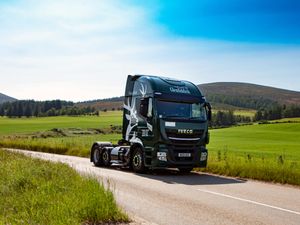Scotch whisky lorries to run on ‘green biogas’ made from distillery leftovers
Glenfiddich said production waste from its distillery will be converted into fuel.

A leading single malt Scotch whisky company says its entire delivery fleet will run on “green biogas” created from distillery residues.
Glenfiddich said production waste from its distillery in Dufftown, Moray, in Scotland’s north east, will be converted into an “ultra-low carbon fuel gas that produces minimal carbon dioxide and other harmful emissions”.
Glenfiddich, which means “valley of the deer” in Gaelic, said it has already installed fuelling stations and its adapted lorries will soon be on Scotland’s roads running on the low carbon fuel.

The technology needed to convert waste into fuel was developed by its parent company, William Grant and Sons, a spokesman said.
Stuart Watts, William Grant and Sons’ distilleries director, said: “It has taken more than a decade for Glenfiddich to become the first distillery to process 100% of its waste residues on its own site, then to be the first to process those residues into biogas fuel to power its trucks.
“We are proud of these renewable energy breakthroughs in our industry as we scale up the de-carbonising benefits of this closed-loop process across our entire transport fleet.”
Mr Watts said the biogas reduces carbon dioxide by more than 95% and other greenhouse emissions nearly completely compared to diesel and other fossil fuels.
Each lorry will displace up to 250 tonnes of carbon dioxide per year, the environmental equivalent of planting up to 4,000 trees, said Glenfiddich.
The company was founded by William Grant in 1887 with the help of his nine children and a stonemason and describes itself as the “world’s most-awarded single malt”.
William Grant and Sons said it plans to make its technology available across the Scottish whisky industry “to support the decarbonisation of transport in line with UK and Scottish governments’ net zero targets”.
Under current plans, Scotland is aiming to become a net-zero society by 2045, five years before the rest of the UK.





